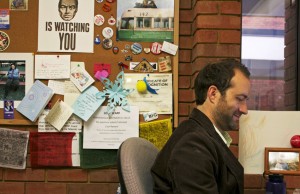Chris Smejkal has been transformed by his past and has a collection of objects to remind him

Alex Kendall
-Sr. Staff Photographer-
Chris Smejkal, a communications professor at STLCC-Meramec, leans back in his office chair in his sports coat and jeans with his legs crossed, his hands together. On the wall are cards and letters from past students, posters and pamphlets from all around the United States and old family photographs. Next to him on the wall are a variety of collectibles from a black-and-white zebra pinata he kept from graduate school to the hundreds of books, each with their own wear marks.
“I’m an object person,” Smejkal said. “I could point to pretty much anything in [my office] and tell a story.”
Smejkal, who has been teaching communications classes at STLCC-Meramec full time since 2007, reaches up from his chair and points to the cans of Play-Doh sitting on the shelf.
“Play-Doh is a great metaphor for how people live their lives in a can and are able to mold themselves how they want. The can is what your parents and teachers tell you to be, and as you enter college, you can mold yourself into what you want to be.”
Smejkal says that he could not find that ability to mold himself until after high school, where he found his niche in college and has never really left it.
“I kind of wanted to stay in college, by teaching,” Smejkal said with a chuckle. “I mean, what an atmosphere, you’re perpetually young. You’re around everybody whose young, new ideas, new experiences; I kind of wanted to stay in that I guess. I love teaching here.”
Smejkal brings his creative and unique personality into the classroom and says that he teaches his class a little less traditionally and more informally but allows the students to learn and understand it themselves.
“I want people to think about what they are learning,” Smejkal said. “So many students want answers, and there’s not always going to be easy answers. People have to enjoy what they’re doing.”
As he finishes his sentence, Smejkal pauses for a moment.
“A real education isn’t just what you get in the classroom, it’s everywhere,” Smejkal said with his hands outstretched. “The places you travel, the people you meet, the things that you experience. That makes you a more well-rounded person.”
Smejkal puts his teachings into his own life through travel around the United States, hobbies such as photography and backpacking, and going out with his wife to different restaurants and concerts.
“I’m a jack of all trades and a master of none, and I like it that way,” Smekjal said. “I always want to learn new things; I always want to do new things. Life is meant to be lived and that’s what it’s for. So many people are so scared to try something that they don’t accumulate any experiences or moments in their life. Go experience things because, man, it’s going to fly by.”
Smejkal sits back in his chair and smiles, looking out the window.
“I think there is a difference between taking your job seriously and taking yourself too seriously. I don’t take myself seriously at all,” Smejkal said with a smirk and his hand on his face. “I take my job seriously, I take what I do for a living seriously.”
Smejkal leans back and looks at the plaques and awards on the top of the shelves, almost hidden.
“I don’t ever really think of getting an award or being asked to speak somewhere or the real kind of things we’ve considered to be the marks of success [as my significant accomplishment],” Smejkal said as he looks back down from the shelf. “When I have a student maybe who’s come back that I had in a class semesters ago contact me and talk to me about what my class meant to them, and being able to reconnect. If I can look back at those people I had a little impact on, man, that’s all I need, that’s better than any degree or any award.”
Smejkal looks back at the wall of collectibles, to his desk and to his board with all of his photos on it.
“I don’t ever want to be accused of not being interesting,” Smejkal said with a grin. “That would be the worst remark I could receive from someone.”











